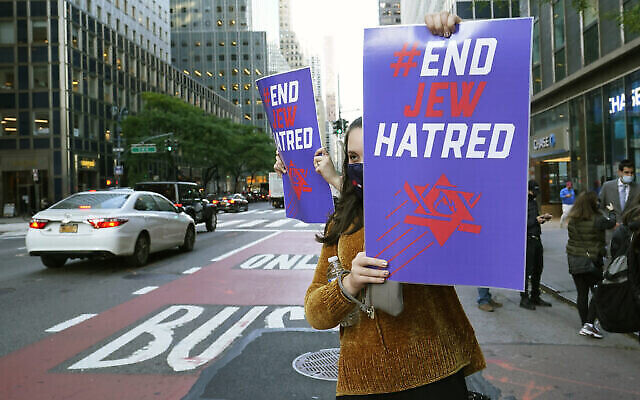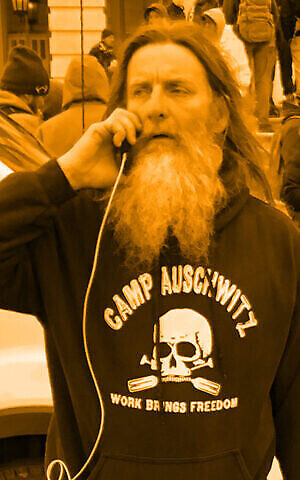Anti-Semitism Fears Made 40% of US Jews Change their Behavior Last Year – Survey
New AJC study helps understand how Americans perceive Jew-hatred, which has caused many to mask their Judaism on- and offline as well as avoid places and events.

Fear of antisemitism spurred 40 percent of American Jews to change their behavior over the past year, according to a new survey about antisemitism in America.
The survey, released Monday, is the latest in an annual series commissioned by the American Jewish Committee to understand how Jewish Americans and the general public experience and perceive antisemitism.
A survey of American Jews found that over the last year, 17% said they “avoided certain places, events, or situations,” 22% avoided making themselves visually identifiable as a Jew and 25% refrained from posting Jewish-related content online.
A companion survey of the general public, meanwhile, found that the proportion of Americans who say they understand what antisemitism is rose sharply in the last year, from 53% in 2020 to 65% this year.
Last year’s survey was taken shortly before the presidential election in which Joe Biden defeated incumbent Donald Trump, whom many Jews perceived as stoking antisemitism. At the time, just 4% of American Jews said they felt more secure than they had in the past; this year that proportion was significantly higher, at 10%.
“Almost 40% of Jews have changed their behavior. This is horrible and heartbreaking data,” Holly Huffnagle, the AJC’s US director for combating antisemitism, told the Jewish Telegraphic Agency about this year’s findings.

“But I think we can’t hide the fact that more Jews feel secure today,” she added, noting that when the surveyors asked for an explanation, “The change in the administration was by far the biggest response to that.”
This year’s surveys were taken in September and early October and included 1,214 Americans overall and 1,433 Jews. The margin of error for each survey was 3.9%. In a shift, the majority of the surveys were completed online, rather than by phone, although Huffnagle said researchers had concluded that the change had not influenced results in any particular way.
Some of the results, including the finding about the proportion of American Jews who changed their behavior out of fear, cannot be directly compared to the AJC’s past antisemitism surveys because this year’s version asked about experiences only in the last year. Previous surveys asked about experiences and perceptions in the past two or five years.
“We decided to lose the trend data in favor of accurate information,” Huffnagle said.
Other findings are comparable over time, and suggest that much has remained unchanged in American Jewish sentiment. The vast majority of American Jews continue to say that antisemitism is a problem in the United States; antisemitism on college campuses remains a concern for many American Jews; and American Jews continue to say they are more concerned about antisemitism emanating from the extreme right than the extreme left.

Half of American Jews say the “extreme political right” poses a “very serious” antisemitic threat, and 91% said they believed the far right poses at least some threat, similar to last year’s finding. In a shift, however, the proportion of American Jews who said they thought “the extreme political left” represents at least a slight antisemitic threat increased sharply, from 61% last year to 71% this year.
Huffnagle said she attributed the increase in the general public’s awareness of antisemitism to multiple high-profile incidents related to right-wing activity, including penetration of the QAnon conspiracy theory, which has antisemitic overtones, and the January 6 insurrection at the US Capitol, where one participant was photographed wearing a “Camp Auschwitz” sweatshirt.
She also said a broader discourse around combating discrimination and hate, spurred in part by a response to attacks on Asian Americans, may have played a role.
“I think there might have been this national wakeup call,” Huffnagle said, adding, “at least about how to answer survey questions.”
Three-quarters of Jews said they had heard “a lot” or “some” about Jews being attacked in the United States and abroad during Israel’s conflict with Hamas in Gaza in May. Three-quarters of those respondents — representing a majority of Jews — said those reports had made them feel less safe as Jews in the United States.
Huffnagle said there was little evidence that the incidents of antisemitism reported at the time had contributed to the shift in sentiment within the general public.
Still, she said, the general public remains notably supportive of Israel — perhaps more so than American Jews. She pointed to the fact that the proportion of general-public respondents who said they viewed the statement “Israel has no right to exist” as antisemitic was higher this year: 85% of respondents said the statement is antisemitic, compared to 77% last year.
A companion survey of the general public, meanwhile, found that the proportion of Americans who say they understand what antisemitism is rose sharply in the last year, from 53% in 2020 to 65% this year.
Last year’s survey was taken shortly before the presidential election in which Joe Biden defeated incumbent Donald Trump, whom many Jews perceived as stoking antisemitism. At the time, just 4% of American Jews said they felt more secure than they had in the past; this year that proportion was significantly higher, at 10%.
“Almost 40% of Jews have changed their behavior. This is horrible and heartbreaking data,” Holly Huffnagle, the AJC’s US director for combating antisemitism, told the Jewish Telegraphic Agency about this year’s findings.
“But I think we can’t hide the fact that more Jews feel secure today,” she added, noting that when the surveyors asked for an explanation, “The change in the administration was by far the biggest response to that.”
This year’s surveys were taken in September and early October and included 1,214 Americans overall and 1,433 Jews. The margin of error for each survey was 3.9%. In a shift, the majority of the surveys were completed online, rather than by phone, although Huffnagle said researchers had concluded that the change had not influenced results in any particular way.
Some of the results, including the finding about the proportion of American Jews who changed their behavior out of fear, cannot be directly compared to the AJC’s past antisemitism surveys because this year’s version asked about experiences only in the last year. Previous surveys asked about experiences and perceptions in the past two or five years.
“We decided to lose the trend data in favor of accurate information,” Huffnagle said.

Other findings are comparable over time, and suggest that much has remained unchanged in American Jewish sentiment. The vast majority of American Jews continue to say that antisemitism is a problem in the United States; antisemitism on college campuses remains a concern for many American Jews; and American Jews continue to say they are more concerned about antisemitism emanating from the extreme right than the extreme left.
Penn State University student and friends sport swastikas drawn in marker on their shoulders. leading to condemnation from the university and fellow students. (Change.org via JTA)
Half of American Jews say the “extreme political right” poses a “very serious” anti-Semitic threat, and 91% said they believed the far right poses at least some threat, similar to last year’s finding. In a shift, however, the proportion of American Jews who said they thought “the extreme political left” represents at least a slight anti-Semitic threat increased sharply, from 61% last year to 71% this year.
Huffnagle said she attributed the increase in the general public’s awareness of antisemitism to multiple high-profile incidents related to right-wing activity, including penetration of the QAnon conspiracy theory, which has anti-Semitic overtones, and the January 6 insurrection at the US Capitol, where one participant was photographed wearing a “Camp Auschwitz” sweatshirt.
She also said a broader discourse around combating discrimination and hate, spurred in part by a response to attacks on Asian Americans, may have played a role.
“I think there might have been this national wakeup call,” Huffnagle said, adding, “at least about how to answer survey questions.”
Three-quarters of Jews said they had heard “a lot” or “some” about Jews being attacked in the United States and abroad during Israel’s conflict with Hamas in Gaza in May. Three-quarters of those respondents — representing a majority of Jews — said those reports had made them feel less safe as Jews in the United States.
Huffnagle said there was little evidence that the incidents of antisemitism reported at the time had contributed to the shift in sentiment within the general public.
Still, she said, the general public remains notably supportive of Israel — perhaps more so than American Jews. She pointed to the fact that the proportion of general-public respondents who said they viewed the statement “Israel has no right to exist” as anti-Semitic was higher this year: 85% of respondents said the statement is anti-Semitic, compared to 77% last year.



comments